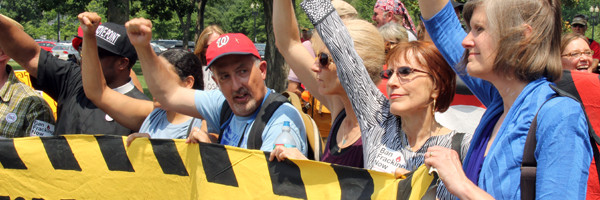Blog and News
Writing From the Outside In: On Activism
- DateNovember 27, 2014
- AuthorMary Heather
- Categories
- Discussion0 Comment
I have been thinking a lot about activism this week, in part because so much has been going on: the anti-rape marches at UVA, the racial protests in Ferguson and beyond, and the feminist editorials condemning inaction on long-standing rape accusations against Bill Cosby. I have been thinking about the struggles of my friend and fellow writer, Sandra Steingraber, and We Are Seneca Lake’s civil disobedience to save their community’s drinking water from the fracking industry in the Finger Lakes area of New York. Sandra was released from jail today, her second visit there, after blockading the Crestwood natural gas storage facility in protest.
Watching updates of Sandra’s arrest, along with all the other protests on social media and TV reminds me of how demanding this work can be. Reminds me of the challenge of trudging uphill, of the stamina required to proceed forward despite the forces working against. Rick Bass wrote a beautiful essay about activism fatigue several years ago: “Activism’s Paradox Mountain“ — a piece to which I find myself returning every now and then. But there’s a reason they continue to climb, almost always a story behind the sacrifice.
A few weeks ago, I completed an application for a writing retreat, in which I was asked to provide a personal response to the following Virginia Woolf quote:
“I’m fundamentally, I think, an outsider. I do my best work and feel most braced with my back to the wall. It’s an odd feeling, though, writing against the current: difficult entirely to disregard the current. Yet of course I shall.”
As a writer whose work is often motivated by environmental issues, this quote speaks to me directly in terms of the margins from which I write — and from which others write, as well. I know that my ideas and those of my literary heroes aren’t always popular, because they push back against traditionally held American ideals. Things like capitalism and exceptionalism, the rights and responsibilities of individuals verses corporations, guns and “scientific proof.” It’s hard to question our traditions — because these ideals have taken many of us far, have rewarded some of us well… well, except for those people and places whose needs are at odds with our traditional American beliefs.
But it seems to me that our greatest truths don’t begin as commonly held beliefs. Rather, they come from stories — stories of pain, of injustice that we labor to deliver so that the truth may be revealed. That we are all created equal, for instance. There is still much work to be done on that.
The work is difficult, unsupported. It would be easier to fold into one’s self and float, bobbing and weaving through the rushing water, propelled by conformity and the sound of its applause, along the path of least resistance. Easier still to allow your direction and destination to be determined by the urgency and velocity of someone else’s values, of other people’s rules.
And yet. A salmon will leave the ocean and return to its natal stream, whose salt-free waters will assault its cells and strip the skin right from its flesh. And fourth generation monarchs will ignore the impulse to mature and mate, saving their energy instead for the long flight from as far north as Canada to Mexico’s southern tail — a journey whose distance and hardship defies all logic, but without which would define the end of its kind.
The work that we do is hard. We shed our skins and bare our vulnerable selves, and for some of us, this pilgrimage can feel like death. Or maybe it’s our birth. Either way, we must continue to write our stories. The survival of our kind depends on it.
Cover image courtesy of Ecowatch.org
About Mary Heather
I am an East-coaster and a West-coaster. I am an academic and a creative spirit. I am an environmental scientist who always wanted to write, and a writer with a nagging nostalgia for the complexities of environmental science. Above all, I am a mother — so whether I’m writing about the natural world, family, or place, I like to consider my work as environmental advocacy in the broadest sense.
Tags
Recent Posts
- Five Year Mark
- On Writer’s Block: Notes from the Kitchen Island
- The Things They Carried
- Notes from a Soft Target
- On Advocacy and Love
- 2018 Moravian College Writers’ Conference
- Empathy
- The Fact of a Penis
- Labor Day
- On Hiding
- Memorial Day
- #CNF Podcast Episode 43
- Bay Path University’s 15th Writers’ Day
- On Authority and Punishment
- If There Were No Rules
- Science is a Refugee
- 2017 Moravian College Writers’ Conference
- Thanks, Food & Prayers
- Eviction
- Love Does Not Equal Silence
2014 © Mary Heather Noble. Website Design and Development by The Savy Agency.

